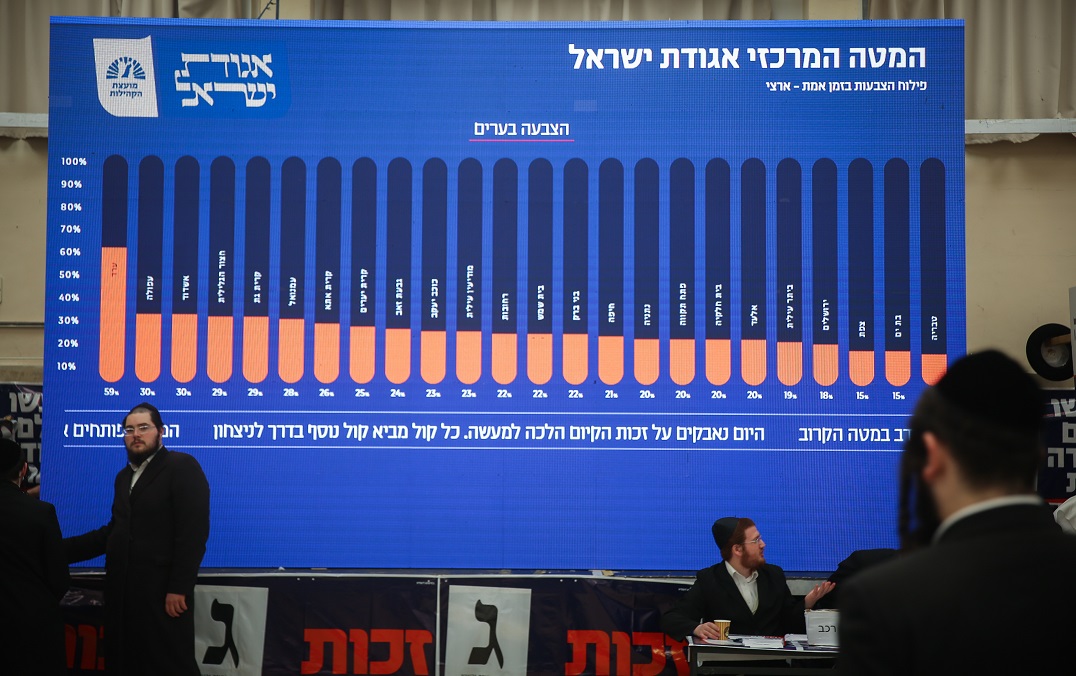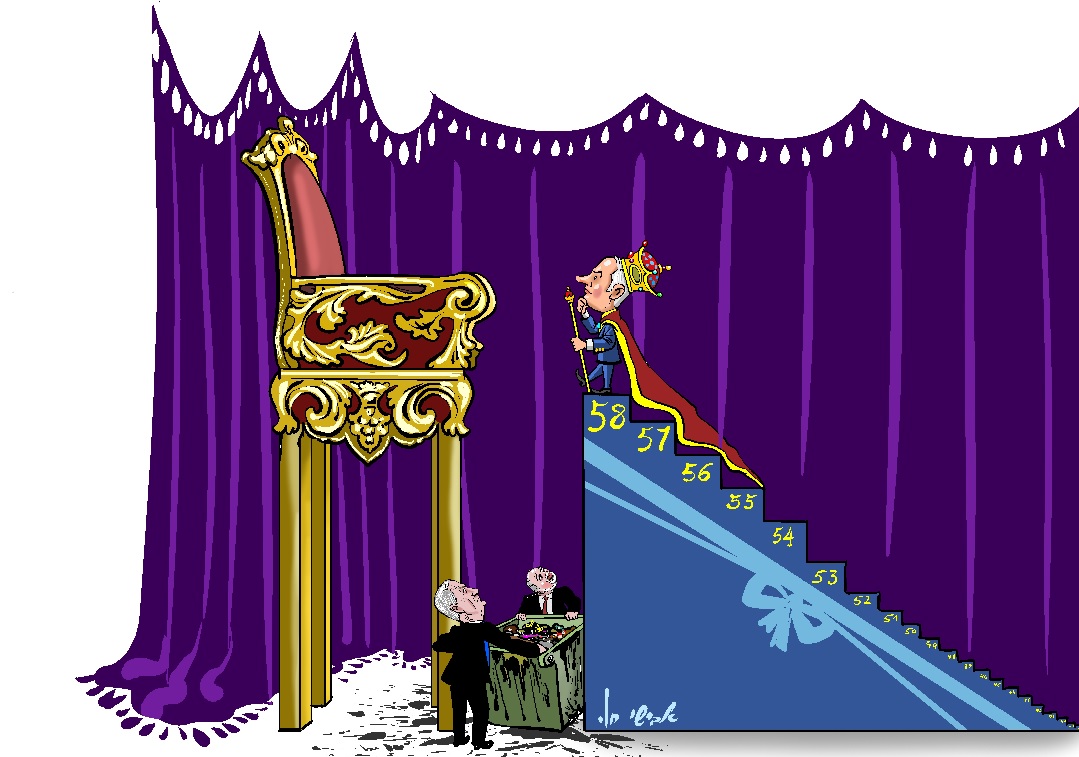Bulldozers Come Home

To maximize votes in the next elections, one of two things need to happen: either divide the forces or unite them

Sad, With No One to Blame
W
hat a few hundred votes can do.
This column was planned for Tuesday night. The 60th mandate seemed to be at hand. A few votes from some corona polling stations, another push from yeshivah bochurim who voted at more accessible polling stations and there it would be: mandate number 60. Then we could be on the way to forming a new government that would bring an end to this saga that has lasted more than a year.
Even the list of credits was ready, with its bulldozers, chiefs of staffs and strategists. By Wednesday morning, none of it remained. With only 58 mandates left in the right wing block, it’s virtually impossible to form a government.
And if that’s not enough, Avigdor Liberman is still quite high on his horse. Once again, he is the most significant player in the field. True, he lost 50,000 votes since last time, but except for a clipped wing, everything has stayed the same.
What’s the lesson?
A bit of modesty, a bit of humility.
And what is sad here is that this a loss without anyone to blame. Everyone gave it their all. They worked hard. Seventy-year-old Netanyahu bounced around like a man years younger, climbing stairs and shaking tens of thousands of hands The turnout also broke 20 year records; people came out en masse for the fourth time this year, including local municipal elections.
But the nation decided what it decided.
And that is a lesson for us.
A Mirror Image
I
saw him standing on Tuesday afternoon near the Chassidim shul in Bayit Vegan. He had a glazed look in his eyes, and his phone was pressed against his ears by his shoulder; his hat was tilted back as he leaned on a car with a pen in his hand and a paper on the windshield, speaking to a friend sitting somewhere gazing at a Central Election Committee screen.
“So you say that the United Arab List now has a bit more than 500,000? Nu, that won’t hold up with the double envelopes. I’m telling you, we dealt them a serious blow this time; there were a lot of votes cast at handicapped access polling stations. But you know what, let’s go your way. Don’t take anything off for the Arabs, but you have to subtract some of Labors. Shas has to go up, right? Yes. So how much do you have left there? Excellent. I told you everything was okay.”
He tallied up the numbers on his scribbled-up piece of paper, ended the conversation with a winning grin – and then went to daven Mincha.
He had put in his day’s work. He had brought about Netanyahu’s 61st mandate. It hadn’t been easy. Between four eyes he’ll admit that he fudged the numbers a bit. Adjusted them tens of thousands up or down, rounded out problematic looking figures. But you can’t say that he wasn’t fair. He offered very precise predictions about the double envelopes, talked to some ‘people in the know’, and with his own two hands, formed the next government.
He was a fantastic mirror image.
That’s what we all look like.
We have replaced our Siddur and our tefillos with the Bader-Ofer Law rule book, and HaKadosh Baruch Hu showed us that He has plans of His own.
Both that young man who managed to extract 61 mandates from his crumpled paper and us – all of us – who sat down on election night to praise Netanyahu on his winning streak, received an unequivocal message form Above: Leave me the papers; focus on what I told you to do. Daven. Learn. Ask.
And it’s never too late to do that.
Who Will Put Down the Keys
I
t was hard not to follow the prolonged celebrations at the Shas headquarters and the somewhat disappointed sentiment at UTJ the day after elections.
First, the facts, then the analysis.
The two parties increased the number of votes they garnered in this third round. Shas went up six percent, and crossed the golden number of 350,000 votes. UTJ went up two percent, receiving nearly 275,000 votes. The number of mandates remained as it had been the last round, UTJ with seven, Shas with nine.
We need to candidly admit that Shas’ achievement is nothing less than dramatic. The party that was eulogized as teetering on the electoral threshold just a year ago has become a large and stable party that grows from one election to the next. That’s a reason to celebrate.
But its Ashkenazi sister party that concludes this third election with a rise of nearly 40 percent since the election five years ago also has no reason to feel disappointed. Its voters came out en masse. The natural growth might explain ten percent; all the rest are new votes.
Take Tzefas for example. In 2015, UTJ got 1,400 votes there. This last election, Rav Chaim Kanievsky came to the city for a rally, and the results were amazing: 2,700 votes. Nearly double. This happened in many places.
So why the disappointment? Where are the celebrations and the dancing?
Not here.
In general, the most salient difference between Shas and UTJ can be compared to the difference between a public company -- a government ministry or union entity – and a company that operates in the private sector.
UTJ is a union style party. It’s a company whose shares are scattered among dozens of complacent investors, and none of them gains or loses directly from a rise or fall in the stock prices. There is no CEO working to increase yields; no price paid by workers who lag in productivity. Even when there are losses, they are accepted with equanimity.
Shas is a private company with one owner and CEO.
All the company employees understand very well that if they don’t do their job well, they will be sent home that same day. The private market is brutal. A worker who is not worth his salary simply doesn’t get it.
UTJ is an endless federation of sub-streams. When there is a failure, a hundred accusatory fingers can be pointed in every direction. No one needs to take responsibility, and therefore, no one has a big drive to achieve. There will always be someone who claims that the increase was from Chabad, the central faction, the National Religious community, secret agreements with the Peleg and so forth.
With failure, as well, baruch Hashem, there are no widows. They will blame the working chareidim, Chabad, the disputes in various Chassidic courts, the headquarters and the transportation.
When there is no credit for success and no accountability for failure, there is no one to take responsibility.
The only ones who took responsibility -- and it is in their credit that there was such success – are Gedolei Yisrael. Rav Chaim Kanievsky traveled from city to city with mesirus nefesh for the fifth time this year (including two local elections in Jerusalem and Tzfas), and made the difference between failure and the ultimate success that transpired.
This thesis is based, among other things, on cases where parts of UTJ had personal responsibility.
Take for example the local elections last year, when UTJ was splintered into tribes, and the factions began to operate in personal responsibility mode.
The Degel HaTorah faction had a series of successes in every city where it ran independently: Jerusalem, Tzfas, Haifa and wherever it followed the Shas model. The Shlomei Emunim faction, which for years has functioned in local elections on a high pressure personal model, was able to make significant gains beyond its proportionate strength.
When people understand that they are fighting for their home, that they will be measured by successes and failures, that they have no one to blame, they play differently.
The Price of Partial Unity
E
xactly one year ago, the initiative of a pan-chareidi unity was raised.
The climate was suitable, Shas was floundering in the polls and the understanding was that a private company sometimes prefers to make a small exit than to go for an IPO that will end in collapse.
The logic behind this initiative has not changed today either. Such a unification will convey a message that a thousand campaigns cannot generate: a sense of public emergency. When you see Gedolei Yisrael from across the spectrum gathering together to fight for our home, that can bring a result where the whole is greater than the sum of its parts. Though it did not happen then and the momentum has slowed, the idea hasn’t changed.
But in the end, if it is necessary to put a finger on the difference in the attitude towards results, between Shas’ celebrations and UTJ’s disappointment, it is there:
Anyone who works in Shas knows that if the results are interpreted as a lack of success, people will go home.
Five years ago as well, when Shas’s strength declined, we saw a lot of celebrations. True, Shas was in the fight for its life and survived, but the celebrations reflected the activists’ understanding that if they do not dance they will be buried.
So they dance with whatever there is.
This time, they have a real reason to dance.
It is doubtful if Deri himself believed that he would bring such results. He took a sectoral chareidi party and rehabilitated it from its past woes, the discord and the strife, and turned it into a united, national party with a large potential for growth in the post-Netanyahu era.
But that has also happened in no small measure because of its managerial flexibility.
The decision to target the traditional periphery areas, to play on the emotions, to proudly put Netanyahu at the center of the campaign, and even to awaken Begin and Ben Gurion from their resting places – turned out to be a game changer. UTJ does not have space for innovation, there are too many opinions, and too many people that have nothing to lose or win, other than wrinkling their noses at every idea.
In the current state of affairs, there is no doubt that to maximize votes, one of two things need to happen: either divide the forces or unite them.
In the next elections, which will hopefully take place in four years, the option of significantly increasing chareidi representation will hinge on difficult decisions being made that may not sound pleasant: real unity, or real division. If Degel runs alone and Agudah runs alone, each one of them will be ready to give their lives, so to speak, for the mission. There will be new alliances, new ideas, people who will battle from the bottom of their heart and soul for success. It will be a war for the house of each and every one of the representatives. Even a Jew that doesn’t have a regular shul, and wears a kapote on Shabbos and a hat with a kneitsch will feel that it affects him.
And of course, there is the more positive and more Jewish possibility: unite the forces.
Present a united front of all the G-d fearing Jews in the country. We see the growth of this population, their yearning to connect to tradition, to Yiddishkeit and to values. Such a party would be the third largest and can bring dramatic achievements.
The Arabs understood this and were able to bring communists, Islamists, and secular Arabs together even though they cannot stand each other on a day to day basis. They brought tens of thousands of new voters out of their homes. There is no reason in the world that we, the G-d fearing public, should not succeed in doing the same.
(Mishpacha.com)
Oops! We could not locate your form.












